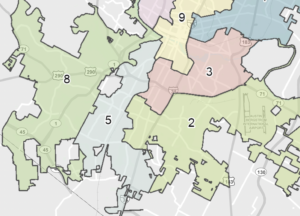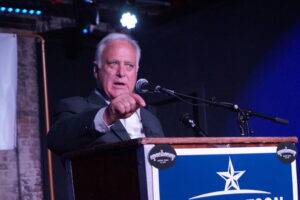Israel and Watson advance; incumbents avoid runoffs
Mayoral candidates Kirk Watson and Celia Israel advanced to a runoff last night after an election season focused on Austin’s growing pains: the rising cost of living, the lack of affordable housing, crowded roadways, and a growing homeless population.
Israel, who had declared “this election is about who can afford to live here,” took 39.99 percent of the votes across Travis, Williamson and Hays counties. Watson came in second with 34.95 percent, while third-place finisher Jennifer Virden won 18.44 percent. Three other mayoral contenders collectively netted just 6.62 percent.
Austin is fast gaining a reputation as one of the least affordable cities in the country amid increases in home prices, rents, mortgage rates, and property taxes.
Israel and Watson offered different visions for how to address the problem, with Israel promising an ambitious overhaul of the city’s land code, while Watson proposed dialing back annual property tax increases and adopting “district-specific (land code) reforms” that still protected the “character of our existing neighborhoods.”

Apart from policy differences, Watson and Israel also built markedly different coalitions. Watson drew more support from Austin’s businesses, public sector unions, and established Democratic leaders, while Israel attracted support from progressive advocacy organizations, university students, urbanists, and housing advocates.
The crowd at Israel’s watch party at Lustre Pearl East off Cesar Chavez Street was decidedly younger than the one at Watson’s at Speakeasy on Congress Avenue. Many wore distinctive orange “Celia” T-shirts, with a sprinkling of black Beto shirts in the mix. At Speakeasy, many of Watson’s supporters donned button-downs, blouses, or blazers, and the drinks of choice were cocktails and wine rather than Lone Stars.
Housing affordability was the focus of many of the council races too, particularly in District 9 in central Austin, where Zohaib Qadri topped a slate of other urbanist candidates and their growth-skeptic rival, Linda Guerrero, a former leader of the Hancock Neighborhood Association. Qadri took 29.94 percent of the votes to Guerrero’s 22.34 percent.
That race will go to a runoff election, as will Districts 3 and 5. The runoff is scheduled for December 13th with early voting starting December 1st, leaving candidates just five weeks to make their case.
Incumbent Paige Ellis avoided a runoff in District 8 in southwest Austin, taking 58.27 percent of the votes in a four-person field. District 8 includes a small portion of Hays County.
In District 1 in northeast Austin, incumbent Natasha Harper-Madison scored a narrower margin of victory, winning 53.76 percent in a four-way race.
Harper-Madison had faced attacks from her opponents and political action committees over her handling of public safety and zoning issues, and for voting repeatedly to increase property taxes. However, her fiercest critic, Clinton Rarey, won just 10.33 percent of the votes. Misael D. Ramos, president of the Blackland Community Development Corporation, which develops affordable housing, placed second with 25.06 percent.
East Austin race more competitive than expected
Meanwhile, open races to replace retiring council members Ann Kitchen in District 5 and Sabino “Pio” Renteria in District 3 both resulted in runoffs. In the latter, José M.A. Velásquez won 36.43 percent of votes in a six-way race, with Daniela Silva taking 34.42 percent.
That outcome was perhaps closer than City Hall watchers were expecting, given that Velásquez had a fundraising advantage of more than three-to-one over Silva, according to the Bulldog’s analysis of all contributions for this election cycle.
Velásquez ran on a record of volunteerism and civic leadership rather than a more issues-focused campaign. Though a first-time candidate for public office, Velásquez was politically well-connected, counting as mentors several experienced local political operatives, including Travis County Constable George Morales III and former Austin ISD trustee Paul Saldaña, who was previously Mayor Gus Garcia’s chief of staff. Velásquez’s mother Yolanda Velasquez was a legislative aide to State Senator Gonzalo Barrientos.
Silva, the second-place finisher, ran with on a focus on the environment, housing, and healthcare infrastructure. A self-described “young progressive,” she moved to Austin only recently after serving in the Peace Corps and earning a master’s degree from Texas A&M University in 2019. Silva won endorsements from the Sierra Club, two-time Congressional candidate Julie Oliver, and Austin Justice Coalition founder Chas Moore, among others.
South-central race also hard-fought
The dynamics in District 5 were similar. The first-place finisher Stephanie Bazan was a first-time candidate for public office who ran on a record of civic service and drew support from numerous community leaders and City Hall insiders. Her campaign flyers referred to her as a “Working Mom,” “Native Austinite,” and “ONE OF US.”

Bazan, who won 29.30 percent of the votes, works as a communications officer for a law firm. She serves on the Steering Committee of the Austin Community Foundation Hispanic Impact Fund and on the board of The Junior League of Austin. On her website and in a filmed candidate statement, Bazan noted that she is a “proud member of the Limon family,” a politically active Austin family that traces its roots in the city to the 1800s.
She heads to a runoff against Ryan Alter, also a native Austinite, who scored 24.20 percent of the votes. Alter, a lawyer and longtime Capitol staffer who worked for three Democratic state senators, cast himself as an analytical leader with policy experience. He won an endorsement from the Austin Chronicle for having “the most fully developed housing plan (called Housing Now) of any candidate in any Council race; he’ll be able to walk into City Hall with a mandate to immediately seek support for big changes.”

Placing third in the race was Ken Craig, a longtime senior policy advisor to District 5 Council Member Ann Kitchen, and her preferred successor. He won just 19.13 percent of the votes, despite endorsements from public sector unions, environmental groups, and prominent Democratic clubs. Unlike most of the winners in the council races, Craig had offered a somewhat different perspective on land use, proposing an “intentional and directed” policy relying on small-area planning rather than a citywide approach.
His defeat could tip the balance of power on the issue of land use. Of the four council members who fought CodeNext, the controversial rewrite of the Land Development Code—Alison Alter, Ann Kitchen, Leslie Pool, and Kathie Tovo—only two will remain. However, that bloc would be strengthened if Guerrero were to win her runoff in District 9.
Tough-on-crime candidates fall short
Compared to 2020, this election focused less on issues of public safety and policing. For example, only two of six candidates in District 3 made the issue a campaign priority—Esala Wueschner and Yvonne Weldon—and they got just 13.07 percent of the votes combined. They were also the two least funded of the six candidates running in District 3.
Similarly, Republican Richard Smith in District 8 campaigned to boost police funding but took just 28.17 percent in a four-way race, and Republican Bill Welch in District 5 did the same but took just 14.85 percent in a six-way race. Also in District 5, Aaron Velazquez Webman adopted a pro-police tone without expressly calling to increase police funding; he placed fifth with 10.07 percent.
For comparison, Republican challengers in 2020 forced runoffs in two districts after campaigning to restore police funding and jobs that the council had cut that summer. Mackenzie Kelly won her runoff against D6 incumbent Jimmy Flannigan with 52.25 percent while Jennifer Virden narrowly lost hers to D10 incumbent Alison Alter with 48.65 percent.

Virden sustained the same emphasis in her mayoral campaign, saying that restoring full police staffing was “the first plank of my campaign platform.” Her defeat to Watson and Israel brings to a close more than two years of campaigning that began with her run against Alter in 2020. But as a staunch Republican running in a deep-blue city, she put up a fight and won 56,189 votes, and her endorsement could play a role in the runoff.
While the public preoccupation with policing may have waned, for now, issues of traffic and transit infrastructure again have moved to the fore. Now that the pandemic has eased, normal traffic patterns have reemerged, exacerbated by urban growth. Watson ran with a focus on traffic gridlock, saying the city’s “central challenge” in years ahead would be to effectively execute on major transportation projects already in the pipeline, including the Project Connect light rail expansion, the widening of Interstate 35, expansion of the Austin Bergstrom International Airport, and bond-funded road and trail projects.
Israel likewise published a mobility plan containing many of the same elements as Watson’s, though she differs from Watson in that she wants the I-35 expansion to include an underground portion in the central city that will ease the dividing line between East and West Austin.
Mayoral runoff will be about ‘ground game’
Having been elected mayor twice already in 1997 and 2000 and raising nearly $1.4 million for his campaign, Watson was widely viewed as the frontrunner heading into Election Day. His second-place finish to Israel—a state lawmaker whose represented northeast Austin and part of Pflugerville for eight years—was therefore something of a disappointment.
Israel, who raised more than $410,000, pulled off a strong ground game and got a late boost from endorsing newspapers, the Statesman and Chronicle.
The mood at Israel’s watch party on Election Night was more celebratory than the one at Watson’s. “We did it!” Israel declared in a speech. “We made it to a runoff. And we made it to a runoff against the most powerful interests in Austin, Texas.”
“They are not happy tonight. We are happy tonight.”

Watson, however, tried to put a positive spin on things. “I’m not surprised at all. In fact, I’ve been telling people all along to anticipate a runoff. What that does is it gives us the opportunity without any of the chatter above us on the ballot, it gives us the opportunity to reach out to more people, to touch more people, to hear from more people.”
“By the way, I’ll say, I haven’t had a real campaign in a long time…but this has been good for me because I’ve been able to hear the people of this city. So stick with me because we’re going to win this thing.”
Watson was referring to the fact that his most recent elections as state senator were a cakewalk. Watson’s election to the legislature in 2006 was decisive. He faced no opponent in the Democratic primary and only a libertarian candidate in the general election. In 2010, he trounced a Republican rival in the general election 61 percent to 36 percent. Again in 2012 and 2014, he breezed to reelection without a primary opponent and without a Republican opponent. His last senate contest in 2018 was only slightly more competitive: he faced no primary opponent and defeated a Republican in the general election with 72 percent of the votes.
Watson has thus always dominated at the ballot box, and the only election he has lost was a bid for attorney general against Greg Abbott in 2002–which wasn’t surprising since no Democrat had won a statewide office since 1994.
Looking ahead, the runoff result will hinge on turnout as well as which candidate can win over more of Virden’s voters and those of the other candidates.
In a brief speech, Mayor Pro-Tem Alison Alter told the crowd at Watson’s gathering, “Now I’ve won two runoff elections and I want to remind you as we go forward tonight that the key to a runoff is whose people go out to vote, so each of us, if we want Kirk Watson to win, we have to help get people out. It’s a ground game of who gets their people out.”
Alter noted she had never endorsed a candidate for mayor or council before but had done so in Watson’s case because “we need someone with experience, we don’t need an experiment.”
Watson, asked by the Bulldog whether he would change his strategy or messaging in the runoff, replied that he would not. Instead, he suggested that he’d double down on his message that he was the most experienced candidate and best able to bring together competing interests.
He said, “My message is that Austin is at a turning point where we need to have someone that has a proven track record of experience and the ability to build the coalitions to get things done—because we don’t have any time to screw around.”
 Trust indicators: Bulldog reporter Daniel Van Oudenaren is a journalist with 13 years experience in local, state, and international reporting.
Trust indicators: Bulldog reporter Daniel Van Oudenaren is a journalist with 13 years experience in local, state, and international reporting.
Related Bulldog coverage:
Watson grabbed 70 percent of mayoral donations, November 3, 2022
Watson circumvented law to fund new medical school, November 1, 2022
What kind of legislator was Celia Israel? October 28, 2022
What kind of mayor was Watson? October 24, 2022
Candidates offer competing visions on homelessness, October 18, 2022
2022 candidates have raised $3 million-plus, October 14, 2022
The man who would be mayor…again, October 10, 2022
Want to get elected but not be accountable? September 28, 2022
Mayor and council candidates rake up $2.3 million, September 7, 2022
Urbanists vie to replace council member Kathie Tovo, August 30, 2022
Let the mayor and council campaigns begin, August 22, 2022








The Sweetheart Tax, Worked for those who have money to burn as candles! Sure, changes for better growth is great in any given scenario. What about bigger growth in educational attainment for local schools? Austin had or had the largest school district in Texas!! These are inner parts of our children being prepared to challenge their future lives, by getting a “ Great ; Applicable education. know their state history, what build’s community stability. By paying it forward to large part of living their best life, staying and giving back to community where they grew up as wholesome individuals, seeing everyday political folks interact by allocating some funds towards 2years/4 years higher learn skills. Not just community construction-by developers, the roadways, lite rails, opera houses. Consider more tangible education tools. many of the new multi million dollar industries have moved here to Austin. chew a little fat so to say about entry levels for those at 16 years of age and up. When you’re at a private gathering raising $$$$; invite others input on sessional internships for middle schoolers. A great percent of students would be so enlighten to known local experience of introducing our young citizens to work ethics at a higher level. You’d be surprised how many high schooler 6- 12 graders can’t write an essay, about themselves just setting short terms goals ( 3 to 6 months). They’re too worried about how to take a SAT! Please consider our younger citizens. Many of them are scared to ask their school counselors bout how to plan ahead for future. Yes, Parents definitely need to help their teens moving forward in some serious planning where they are going into futures ventures. Curriculums need to be structured in this speed, light of building and learning.
Everyone should prosper in life as opportunities are available around them.
Thanks in Advance, for your consideration and support.